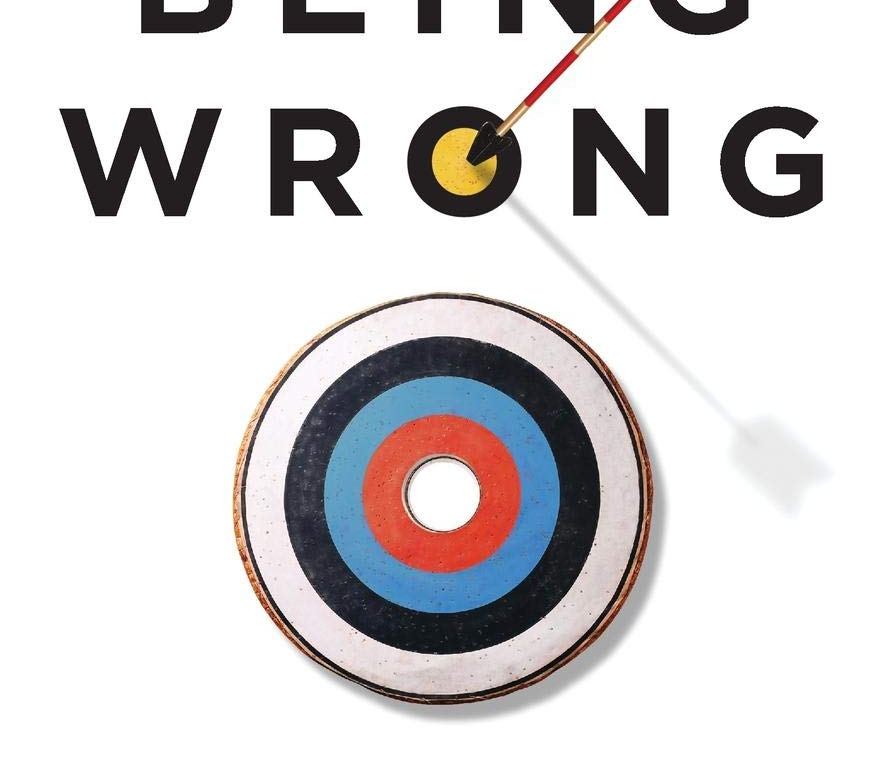In other words, error in extremis – extremely pure, extremely persistent, or extremely peculiar – becomes insanity. Madness is radical wrongness.
Like all equations, this one is reversible. If madness is radical wrongness, being wrong is minor madness.
Kathryn Schulz, in her book Being Wrong, focuses on human error. While I am only through the first part of the book, this statement stood out to me, highlighting something I had not considered prior. In her writing, she looks not only at the factual nature of wrongness but also the feeling. All of us have been wrong. All of us have felt wrong. If my feeling of wrongness is anything like yours, it is one of temporary madness – confusion, anger, frustration, fear, anxiety, and typically we can’t decipher it before it goes away.
As I thought more carefully about this, I tried to figure out why it is so infuriating to be wrong. The temporary conclusion I’ve come to is that wrongness separates us from others. Looking back on a few recent events, it is not only about being wrong, but also being wronged by someone else. Let me share a few:
• In my observations of upper elementary students – the class begins to lose its focus and lots of voices slowly take over, with a few rising above the others. A teacher tells one student to stop talking, to which they reply, “But I wasn’t doing anything.” They were talking. They knew they were talking. Yet their response was a denial with real belief behind it.
• An email from a parent, whose child had been ‘bullied’ on the playground that day. It started with a description of the events as told in the car ride home, but turns into anger and frustration, pointing direct blame at the teachers for their lack of care for her child.
• A student who is struggling with math who simply does not do an assignment work unless a teacher is nearby to make sure that her answers are correct. It is not a lack of math skill, but lack of ability to keep going without a sense of reassurance nearby.
• Teachers, after hearing of a decision that they disagree with, and were unable to take part in, speak with their colleagues in ways that are surprising, confusing, and disappointing.
So what happens in these moments that allow anger and frustration to control our actions. Looking over them, what jumped out to me is that, in each case, the person who is or feels wrong, or is being wronged by someone else, is also being separated from the group. They are being told they are less valuable than others.
The student, who knew they were doing something they shouldn’t, doesn’t want to be singled out from others. The parent wants to make sure that their child is given the same privileges as others. The math student wants to answer questions correctly ‘like everyone else’. (Students often assume that everyone else is getting every answer correct.) The teachers are feeling devalued and questioning whether this workplace is right for them.
I am still in part one of this book and looking forward to part two, but for now, this idea of social connection as an element of being wrong feels very new and different for me. When we think of someone is has ‘gone mad’, we think of someone who is thinking differently than the rest of us. The interesting thing about someone in that state of mind is that they don’t seem to care what the rest of us think about them. Maybe this is what allows them to persist down such a different path.
When we think of some of the greatest minds throughout history, many were called ‘crazy’ by their contemporaries. Yet somehow, they were able to persist down a path of ‘madness’ that felt true to them, and led to some world bending insight. If they hadn’t thought differently, and if they hadn’t been able to block out the need to be accepted socially, the world would not have inherited many important ideas.
I am sure that Schulz will be exploring and explaining the value of being wrong in the book, but I will also continue thinking about the idea of being wronged. I feel like there is a similarity in the feelings that result from these two types of situations and their must be some connection. I know the work of Carol Dweck and others around fixed and growth mindsets tells us that there is value to perceiving our mistakes as opportunities for growth. Could that be the same for when we think others are making mistakes about us?


Thank you for this provocative post. I’ve never considered this perspective on “being wrong” before.
LikeLike
Thank you for reading. Feel free to add your own thoughts to the discussion. I’m excited to read the rest of the book and continue exploring these ideas.
LikeLike